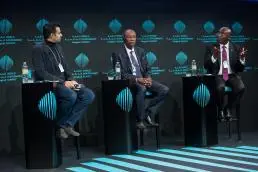PHOTO
President of Guinea calls upon African Countries to Set Independent Development Agenda
Vice President of Ghana Underlines Need to Develop Soft Infrastructure, to Build Platforms to Leverage Technology
Dubai, UAE – “We are ready for the Fourth Industrial Revolution, in fact we are excited about it,” declared His Excellency Alpha Condo, President of Guinea and Chairman of the African Union at a session themed ‘Leapfrogging Development: The African Story’ at the World Government Summit 2017 in Dubai today.
Developing nations that lack the hard infrastructure commonly available in developed nations, can successfully leapfrog the development curve and emerge as pioneers if they focus on the right approaches, systems and technologies that are contextualized to their needs, reinforced panelists participating in the session - Mahamudu Bawumia, Vice President of Ghana and Ashish Thakkar, Founder of Mara Group and Mara Foundation.
Bawumia asserted: “We have to understand that fundamentally the core process of leap frogging has to be led by ourselves. We want to build globally competitive economies with private sector leading the way.”
He stressed upon the importance of private-public partnerships, enhanced regional integration and technology, backed by good governance and sound financial policies to help Africa achieve exponential growth.
The eminent panelists elaborated on the advantages associated with Africa's development and explained how they can be maximized to ensure Africa’s competitiveness globally. President Condo cited ‘energy, ecology and infrastructure’ as development priorities for Africa.
The mobile telecommunication sector has been hailed as an example of a sector that has successfully made a leapfrog backed by private enterprise, growing its subscriber base from 25 million users in 2001 to over 650 million users in 2012. Other potential developments that could contribute to leapfrogging the growth of Africa and prepare technology platforms for it to leverage include the creation of unique biometric IDs for the population, unique property addresses via GPS technology and financial inclusion – all of which are common pillars of soft infrastructure that need to be developed across the continent.
Welcoming the move to introduce a friendly ‘African Union’ travel policy, which presently only boasts a diplomatic passport, both leaders echoed the sentiment that ease of travel in the continent will improve intra-continental trade amongst its 55 constituent nations.
For his part, Ashish Thakkar noted that innovation and entrepreneurship are priorities, and digitization across Africa will help the continent to grow.
In the past decade, the annual growth rate in Africa's economies has averaged 5%, well above the global average. This growth rate was facilitated, in part, by calculated government approaches that include introducing liberalized policies, embracing new technologies and encouraging SMEs, and opening up to global markets. Africa achieved this milestone despite pressing hardships such as poverty, climate change, political turmoil and the recent Ebola outbreak of 2014 - all of which continue to remain potential challenges.
The World Government Summit (WGS) 2017 has drawn the participation of more than 4,000 personalities from 139 countries around the world, reflecting the leading stature of the summit on regional and international levels and the high interest from governments, global organizations, private and public sector entities, decision makers, entrepreneurs, academics and university students as well as scientists and innovators. WGS 2017 features 150 speakers across 114 sessions that highlight the world’s most pressing challenges and showcase best practices and cutting-edge solutions to deal with them.
-Ends-
© Press Release 2017




















